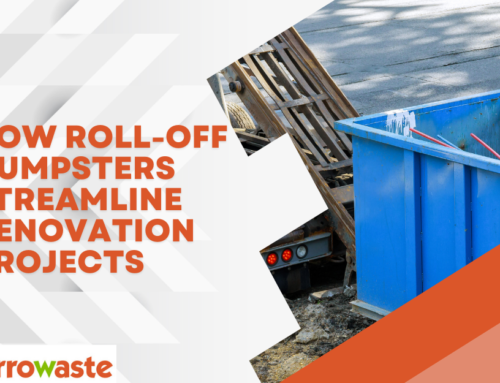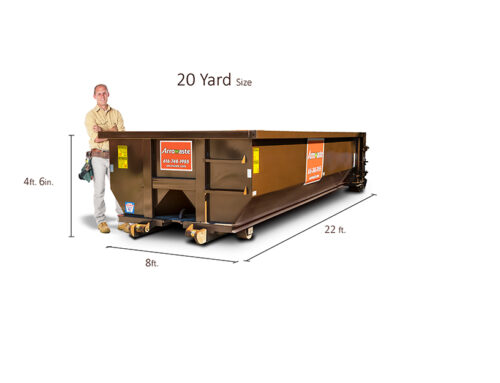Dumpster rentals are convenient for efficiently managing waste, but only some things belong in these bins. It’s crucial to be mindful of what goes into a dumpster to ensure safety, compliance with regulations, and environmental responsibility. In this blog post, we’ll explore common dumpster rental questions about the items that should never find their way into a dumpster, ranging from refrigerants to household cleaning fluids.
- Refrigerants: Dumpsters are not the place for old refrigerators or air conditioning units. These appliances often contain refrigerants like chlorofluorocarbons (CFCs) or hydrochlorofluorocarbons (HCFCs), which are harmful to the environment. Proper disposal of these items involves taking them to a designated recycling or disposal facility where the refrigerants can be safely removed.
- Hazardous Waste: Dumpsters are strictly off-limits for hazardous waste materials. This includes items like pesticides, chemicals, and any materials labeled as hazardous. Instead of tossing these in a dumpster, it’s essential to follow local regulations for hazardous waste disposal, which may involve special collection events or drop-off locations.
- Paint: Paint cans may seem harmless, but they contain chemicals that can harm the environment and human health. Instead of tossing paint cans into a dumpster, check with local recycling centers or hazardous waste disposal sites for proper disposal methods. Some places may accept dried-up paint cans, while others may have specific instructions for disposal.
- Tires: Tires are unsuitable for regular landfill disposal due to their composition and potential environmental impact. Many areas have tire recycling programs or designated drop-off locations for proper disposal. Contact local tire shops or recycling centers to find the best way to dispose of old tires without using a dumpster rental.
- Non-alkaline Batteries: Batteries, especially non-alkaline ones, can contain hazardous materials such as mercury, cadmium, or lead. These materials can pose environmental risks if not handled properly. Many communities have specific recycling programs for batteries, and some retailers may offer collection bins for battery recycling.
- Medical Infectious Waste: Medical waste, including infectious materials, has strict disposal regulations for safety reasons. Never dispose of medical waste in a regular dumpster. Healthcare facilities and other generators of medical waste must follow specific guidelines and work with licensed disposal services to ensure safe and proper disposal.
- Oils and Fuels: Dumpsters are not suitable for the disposal of oils, fuels, or other automotive fluids. These substances can contaminate soil and water, posing significant environmental risks. Local auto parts stores or recycling centers often accept used oil for recycling, ensuring it is disposed of properly.
- Household Cleaning Fluids: Common household cleaning fluids may contain harmful chemicals that can harm the environment. Instead of throwing these items into a dumpster, check with local waste management authorities for proper disposal options. Some communities have specific programs for the safe disposal of household hazardous waste.
Proper waste disposal is essential for the well-being of our environment and communities. By excluding items like refrigerants, hazardous waste, paint, tires, non-alkaline batteries, medical infectious waste, oils, and fuels in dumpsters, we can contribute to a cleaner, safer, and more sustainable world. Email or call us if you have dumpster rental questions about what shouldn’t be added to your dumpster rental.
Wondering what can go into your dumpster rental? Click here for more info.


